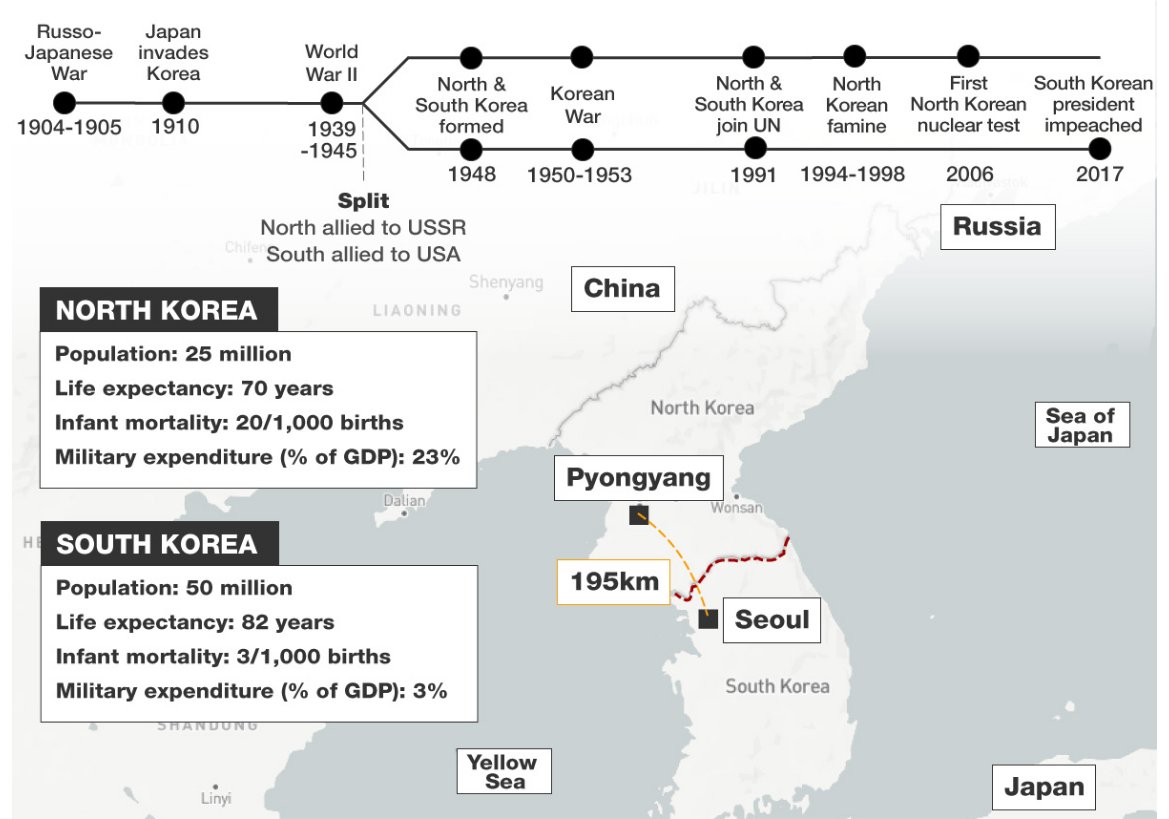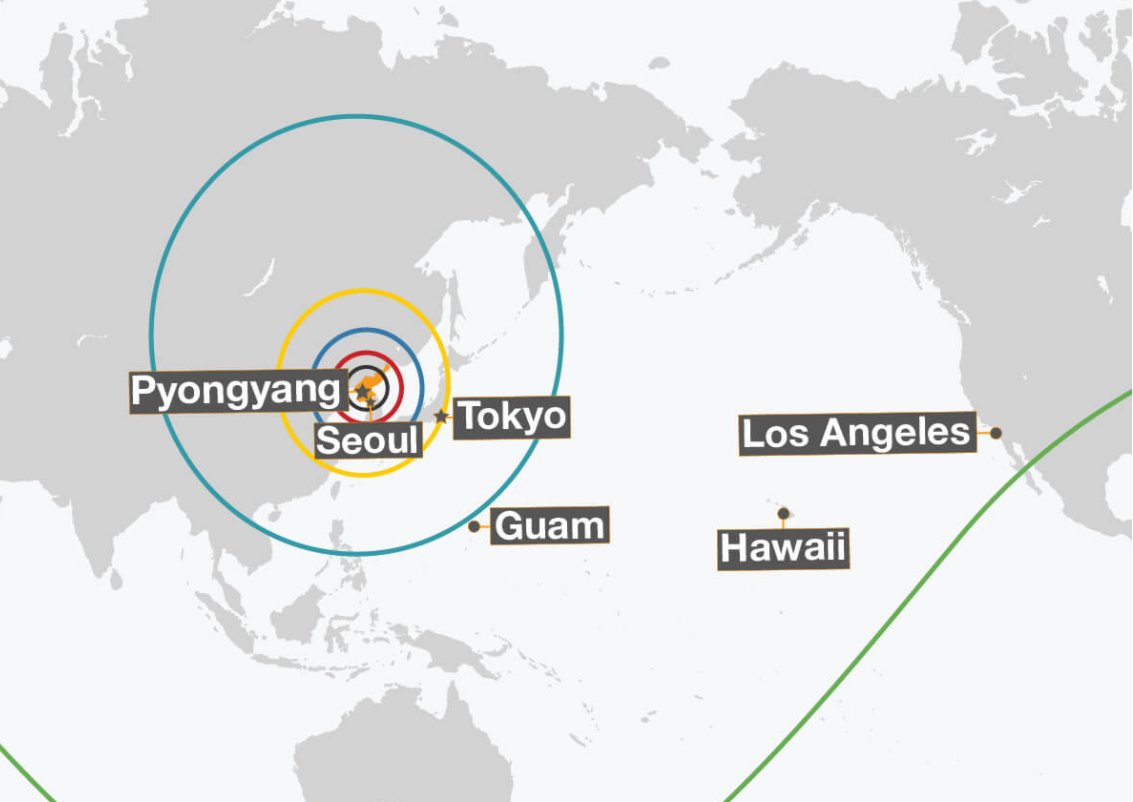Pyongyang accuses Washington of plotting a 'decapitation strike', and sees in nuclear weapons a powerful deterrent.
NORTH KOREA'S NUCLEAR
North Korea's nuclear development activities have long been a source of international condemnation and nuclear war threats.
North Korea carried its first successful nuclear test in 2006, while its nuclear programme started in the Soviet era with the construction of its first nuclear reactor in Yongbyon back in 1965.
Pyongyang's latest nuclear test was in September 2016, and since then it has ground-tested a new rocket engine and test-launched ballistic missiles by firing over sea.
Those activities were followed by new UN sanctions on North Korea in November 2016, while the UN Security Council in February pressed to "redouble efforts" on enforcing the sanctions.
At the time US President Donald Trump also said: "Obviously North Korea is a big, big problem and we will deal with that very strongly."
Shows of force and provocative threats have been exchanged by the United States and North Korea since the US began joint military drills with South Korea on March 1.
Pyongyang suspects those military drills are a rehearsal for an invasion of North Korea or a "decapitation strike" against its leader. It has also accusedthe CIA.
Why is North Korea testing nuclear weapons?
Analysis of North Korea's government statements suggests that the leadership in Pyongyang sees in nuclear weapons the following benefits:
1. Guaranteeing security of the state
2. Economic development and prosperity
3. Gaining respect and prestige in the international arena
On April 14, North Korea's Vice Foreign Minister said: "We've got a powerful nuclear deterrent already in our hands, and we certainly will not keep our arms crossed in the face of a US pre-emptive strike."
North Korea's deputy ambassador to the United Nations, Choe Myong-nam, referred to the annual joint drills between the US and South Korea to justify his country's nuclear pursuits: "It is because of these hostile activities on the part of the United States and South Korea that we strengthen our national defence capability, as well as pre-emptive strike capabilities with nuclear forces as a centrepiece."
North Korea is publicly stating that it is going ahead with its nuclear weapons programme, while the International Atomic Energy Agency on May 4 said it has "concrete information" that this is indeed the case, and points out that security risks would apply beyond the region.
New satellite images of the Punggye-ri site in North Korea have shown workers pumping out water at a tunnel believed to have been prepared for a forthcoming nuclear test, US monitors said.
Has North Korea declared war in 2017?
North Korea has not officially declared war on any country since 1950, but has threatened to launch a "great war of justice for national reunification" and to strike the US mainland in "full-out war... under the situation where the US hurts the DPRK by force of arms," using the alternative name for North Korea.
In 1950, North Korea invaded South Korea, starting the three-year Korean War which ended in 1953 with an armistice, not a peace treaty. This mean that North Korea is still technically at war with South Korea.
The US has 28,500 troops stationed in South Korea, while the Korean Peninsula has been divided by a 4km-wide demilitarised zone stretching 250km along the border.
The US has been performing the annual Foal Eagle military drills with South Korea, imposed sanctions on North Korea and has deployed the Terminal High-Altitude Area Defence system, designed to intercept and destroy ballistic missiles fired at South Korea.
From its side, North Korea has defiantly carried out missile test launches despite regional and US condemnation, and continues to develop its nuclear weapons capability.
How did North Korea get nuclear weapons?
North Korea seems to be pursuing the development of its nuclear weapons capability on its own, while no country is known to supply the country with nuclear weapons.
In the parade of April 15, North Korea has shown off its nuclear weapons and says it has carried out five nuclear tests since 2006.
As of 2017, experts believe it is still likely to take some years for North Korea to indigenously perfect the capability to launch strikes with nuclear warheads on its neighbours.
North Korea has said it is capable of mounting a nuclear warhead on a ballistic missile, but its claims to be able to miniaturise a nuclear device have never been independently verified.
On April 29, North Korea launched an unsuccessful missile test, believed to be the fourth failed missile test since March.
North Korea has a rich source of fissile material, both plutonium from its Yongbyon nuclear reactor and highly enriched uranium from other sites, US-based researchers claim .
North Korea's Yongbyon nuclear facility was built in 1965 with help from Soviet engineers.
The Soviet Union and China have denied supplying North Korea with nuclear weapons, or helping it to build them.
China has fought alongside the North Koreans in the 1953 Korean War, but being interested in the political stability of the region, it says it strongly opposes North Korea's nuclear weapons programme.
India and Pakistan have been accused of connections to North Korea's nuclear programme.
How many nuclear weapons does North Korea have?
It was estimated that North Korea may have produced up to 20 nuclear bombs by the end of 2016, although the true nuclear capability of the isolated and secretive North Korean state could not be verified.
Meanwhile, North Korea asserts it will keep building up its nuclear arsenal in "quality and quantity".
In September 2016, Siegfried Hecker from Johns Hopkins University in Washington toured North Korea's main Yongbyon nuclear facility in 2010 and estimated that North Korea produced enough highly enriched uranium to make additional six nuclear bombs a year.
Experts and governments estimate plutonium production levels from tell-tale signs of reactor operation in satellite imagery.




Comments
Post a Comment